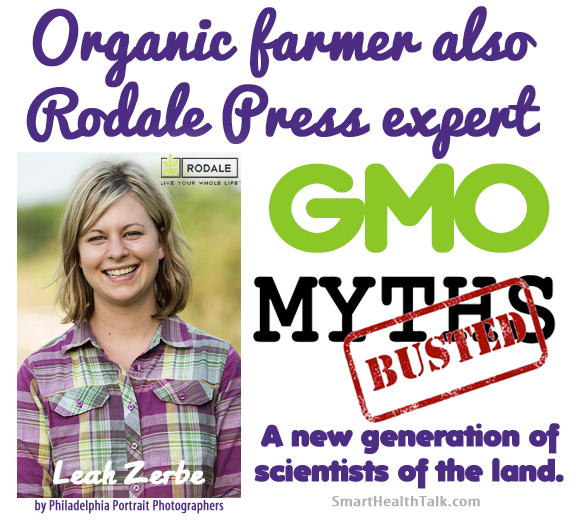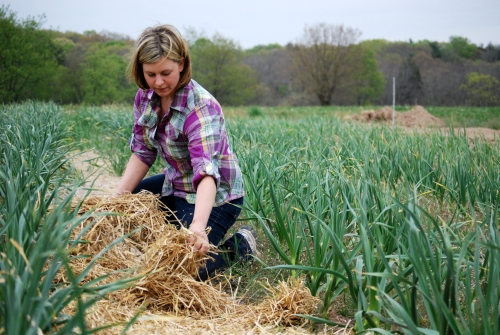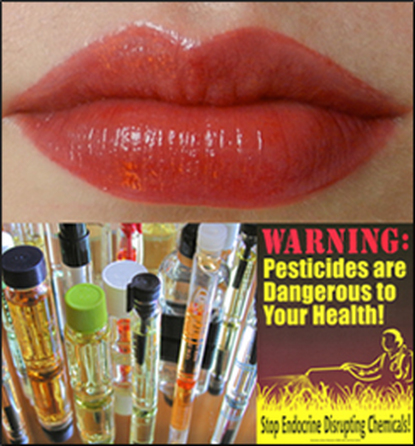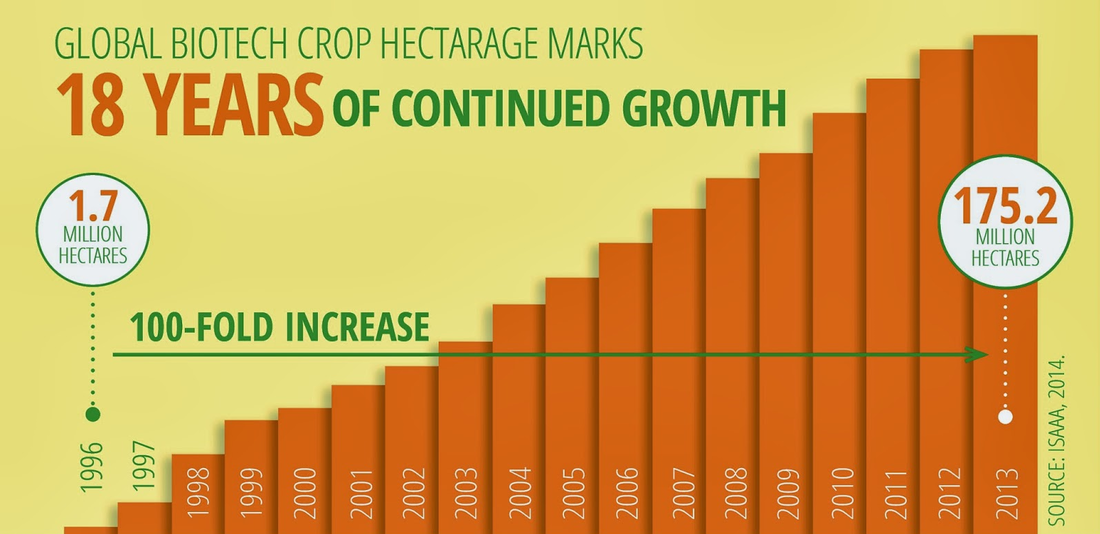Leah Zerbe know exactly what it's like to be an organic farmer because her and her husband own a 100 year old farm in Pennsylvania and feed families every week with a share of their crop.
Rodale has been researching farming and food information since 1935. Smart Health Talk considers their publications and online presence the #1 place for information you can trust. They still do the research before reporting and sometimes that involves research done at their own facilities in Emmaus Pennsylvania where they have tested all forms of farming.
If you find information that contradicts what you hear from Rodale Institute or Rodale News, you probably want to seriously question your sources.
Click here to go to Rodale's Original Article
GMO Myths by Leah Zerbe
The Facts: Genetic modification is different from traditional breeding and presents its own set of unique risks.
• The term "genetic modification" really refers to the unnatural process of taking genes from ones species and using a special gun, viruses, or bacteria to inject it into another organism. This process could never occur naturally in nature. So the genetic modification we're talking about when it comes to seeds and genetically engineered ingredients in our food—we're talking about this completely unnatural process.
• Traditional breeding, known as selective breeding, has been around for thousands of years, where people can cross breed, for instance, tomato plants with favorable qualities, like great flavor, natural disease resistance, etc., with another tomato plant. This IS NOT what happens when we're talking about genetically modified seeds.
• Most GMOs in use now are created to withstand heavy herbicide sprayings. The company that creates the seed also sells the chemical you use on it. It's a package deal.
• Bonus Tip—Look for organic seeds from companies that take the Safe Seed Pledge. These companies go to great lengths to avoid purchasing seed from companies that promote GMOs.
GMO Myth #2: We need GMOs to control weeds and pests.
The Facts: In an ironic twist, GMO technology has actually made pest problems more severe.
• Most of the GMO seeds currently in use were genetically manipulated to either produce their own pesticides inside of the plant or to withstand heavy doses of chemical pesticides that would normally kill the plant.
• In 2012, there were 154 million acres of genetically modified soy, corn, alfalfa, cotton, canola, and sugar beets developed to withstand chemical herbicide dousing.
• About a third of that land now harbors superweeds, problem plants that won't die when sprayed with the GMO's intended weed-killing chemical.
• Most are designed to withstand high doses of glyphosate, the active ingredient in Roundup.
• Weeds quickly became resistant to glyphosate, meaning heavier—and more frequent applications—are required to try to combat weeds.
• Professor Chuck Benbrook, PhD, a research professor at Washington State University, recently found that between 1996 and 2011, GMO technology actually increased herbicide use by 527 million pounds—that's an 11 percent bump. (The study appeared recently in the journal Environmental Sciences Europe.)
Listen below to hear Dr. Charles (Chuck) Benbrook's warnings on risks and losses associated with GMO/pesticide use. Go to his profile. Follow Benbrook's Blog.
• In fact, for every fewer pound of insecticide used, 4 pounds of herbicides are used. GMOs are not living up to the promise. It's that simple.
GMO Myth #3: GMOs reduce farmers' dependence on more older, more toxic pesticides.
The Facts: Dow Agrosciences is currently asking the United States Department of Agriculture to approve a new generation of GMO corn and soy crops designed to withstand heavy doses of 2,4-D, an old, toxic weedkiller because current GMOs are failing.
•There's been an explosion of superweeds that are no longer killed with glyphosate. 21 weed species are now resistant.
• Millions of acres of farmland are now abandoned due to the GMO/superweed problem; some farmers are paying up to $150 an acre per hour for hand weeding.
• Due to the superweed crisis, the USDA may approve 2,4-D resistant crops in the coming weeks. Penn State University weed scientists Dave Mortensen, PhD, ran the numbers and predicts this will quadruple chemical pesticide use.
GMO Myth #4: GMO ingredients are safe to eat.
The Facts: GMO ingredients have never been adequately tested for long-term impacts on public health despite hitting the market in 1996.
• There are about 600 studies focusing on the composition of genetically engineered foods, looking at things like calories, protein, fat, and vitamins.
• These mostly industry-funded studies are generally performed to show the Food and Drug Administration that the food is nutritionally comparable to non-GE foods, or to convince livestock farmers that GE feed is on par with non-GE feed.
• Both types of studies have next-to-nothing to do with human health and safety, Benbrook warns.
• Some of the very few studies looking at shorter-term health impacts suggest cause for concern. A carefully designed meta-analaysis of 19 longer-term published studies looking at mammals found those fed genetically engineered corn or soybeans experienced kidney, liver, and bone marrow damage, potential indicators for chronic disease.
• GMOs are also implicated in skyrocketing food allergies rates.
• Roundup, the chemical often sprayed on GMOs, has been linked to certain cancers, DNA damage, premature births, and ADHD.
• Warren Porter, PhD, professor of environmental toxicity and zoology at the University of Wisconsin, Madison, analyzed government data on glyphosate in the environment and found cause for concern. The levels could lead to accumulated levels that could:
o Alter endocrine-mediated pathways, leading to obesity, heart problems, circulation issues, and diabetes.
o Low level glyphosate levels have also been linked to immune system damage, birth defects, cell death, and learning disabilities.
• It's not good for animals, either. In a recent study published in the Journal of Organic Systems, Australian and U.S. researchers found pigs fed genetically engineered feed were much more likely to suffer from severe stomach inflammation and heavier uteri, a condition that could signal endometrial cancer, endometriosis, abnormal thickening, or gynecological polyps, all things that could affect fertility.
GMO Myth #6: GMOs are safe for the environment.
The Facts: GMOs are crushing biodiversity and are implicated in the collapse of several species.
• The catastrophic drop in Monarch butterflies is attributed greatly to glyphosate, the chemical of choice for GMO crops. Glyphosate annihilates milkweed plants, in and near fields and roadways; Monarchs need milkweed to reproduce—their babies need to eat the leaves to live.
• All GMOs designed to be sprayed with weed-killing chemicals are also coated in neonicotinoid insecticides. Neonicotinoids move through the plant and wind up in the pollen, where it's believed to cause neurological problems in bees.
• Farmers use so much Roundup the active ingredient has actually been detected in streams, the air, and even the rain at levels that could harm humans.
GMO Myth #7: GMO technology is an exact science.
The Facts: Although improving, GMO technology is still young and not very reliable.
• When inserting a foreign gene into a plant, there's a 1 in a 100 trillion chance of getting the insertion into the same place twice, according to farmer and GMO researcher Howard Vlieger.
• The desired characteristic inserted into the plant could have other traits, including ones we haven't even discovered yet. We don't know how that could impact human health, but GMOs are already implicated in skyrocketing rates of food allergies.
• Since biotechnoligists only know a sliver of what there's to be known about the genome of any crop species and about the genetic, biochemical, and cellular functioning, even inserting genes at a site deemed to be "safe" could cause a crop to become toxic or feature reduced nutritional value, or reduce it's ability to resist disease, pests, drought, or other stresses, according to an Earth Open Source report.
| | Another Report by Leah Zerbe, |
The problem is not just about GMOs and pesticides, but stopping the global mess they've gotten us into, climate change because the carbon in the air at 400 ppm last happened millions of years ago and the ocean was 85 feet higher.
Micoorganisms in soil are key to the process, but conventional farming kills them off every time the field is sprayed.
Organic no till farming gives micoorganisms the perfect place to live. We are just starting to learn about all of the ways they help and protect us.








 RSS Feed
RSS Feed
